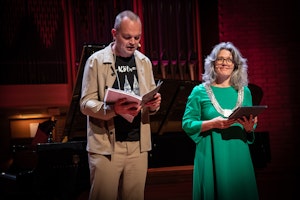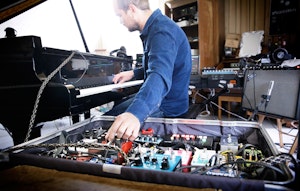The principals at the Norwegian Academy of Music encourage students and staff to stay informed about cultural debates.
Current Music Debates

– It is delightful that colleagues at the Academy are engaging in current debates within the music industry, say Principal Astrid Kvalbein and Vice-Principal Morten Qvenild.
NRK’s music coverage
Kvalbein, who herself has experience as a music journalist and critic, is following developments at NRK (Norwegian Broadcasting Corporation) and acknowledges that many important questions are being raised about the public broadcaster.
– I am also concerned about the quality of conversations, reflections, and the presentation of music, particularly when it comes to so-called niche genres. At the same time, I find comfort in the fact that, after many years in the industry, music and the music scene have proven to be surprisingly resilient to change.

Audiences will come, even if the media fails
The principal cites examples such as concert halls continuing to fill up week after week, even though critics write less frequently about the Oslo Philharmonic than before. Festivals remain lively, and so on.
– I also want to commend the critics and journalists who have maintained quality through many changes in media technology and editorial focus over the years. That matters immensely!

Alarming developments in streaming services
Vice-Principal Morten Qvenild is a musician, producer, and composer who has contributed to approximately 150 recordings.
– Streaming services disrupted the music industry about 15 years ago, and a significant portion of the revenue from record sales, which musicians relied on, disappeared. Meanwhile, the major record labels received a larger share of the profits, he says.
Qvenild notes that streaming models can result in the loss of crucial income for musicians and composers in the music industry.

Declining income
Fifteen years ago, the music industry responded to these challenges by focusing more on concert revenues. However, especially after the pandemic, the market has been under significant pressure.
– We notice through our many connections to the music field – through students, researchers, and staff – that times are tougher in the music industry, and that much of the money that should form the income of musicians and composers ends up with major corporations.
The vice-principal points out that these same companies are also exploring ways to generate their own intellectual property income by creating AI-generated music. For an individual human creator, the overall situation is both alarming and complex.

The industry must take action
– Legislators and industry players – both politicians and musicians – must take action to address the challenging situation facing rights holders and musicians, which will only become more difficult in the future, says Morten Qvenild.
In light of this, it is encouraging to see engagement from so many parts of the industry on these issues right now. It is also heartening to see that high-quality new music continues to emerge from every corner of the Norwegian music scene. This demonstrates the resilience of music as an art form through changing times.



